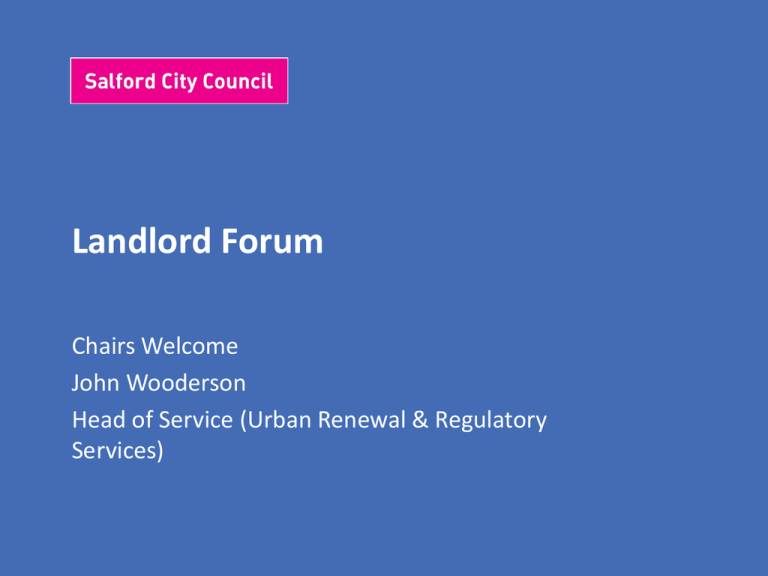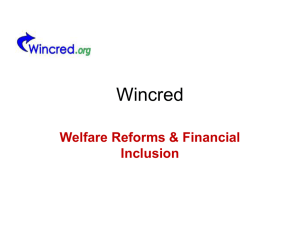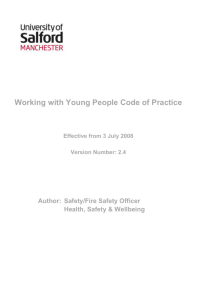Landlord Forum Chairs Welcome John Wooderson Head of Service (Urban Renewal & Regulatory
advertisement

Landlord Forum Chairs Welcome John Wooderson Head of Service (Urban Renewal & Regulatory Services) Organised Crime And Modern Slavery Nigel Hudson LA TAC Advisor DS Jill Vescovi Project Gulf 11th August 2012 September 2012 18th September 2012 Programme Challenger Vision To ambitiously redesign the public service response to organised crime through greater collaboration and integrated working, thereby delivering demand reduction for all agencies and better outcomes for local communities. Why are we here? Community Places Local links Third Sector Statutory Bolton Salford Structure & Frequency Gold-Annually Silver-Monthly Bronze-Weekly DWP, Housing Providers, Children's services, Probation, Tax, Trading Standard’s, Bury Structure & Frequency Monthly meeting Trading Standards, Community Safety, Housing,Public Health,Regulatory Services,Childrens Service,GMFRS, NPS, CRC Adult Services Structure & Frequency 5 weekly meeting, and daily interaction via the JET team. MASH,Education Welfare,Health, Trading Standards, Private Sector Housing,Community Safety Team Housing, DAAT,Troubled Families Trafford Structure & Frequency Silver-Monthly Housing, Benefits, Children's Services Social Care, health, Mental Health, CRC Oldham Gold-as required, Silver Quarterly, Bronze weekly. Housing,Phoenix,Childrens Services,community Affairs,Public Protection, NHS,Community Safety, Education,Youth Services,NGOs Challenger Structure & Frequency Monthly Level 1 and 2 meetings GAIN, GMFRS,Childrens Services,Local Authority,Immigration,Financial Investigation,SOCG,TITAN,NCA,NPS,CRC GLA,DWP,HMRC,Housing,NGOs; AGMA,Environment Agency Manchester Rochdale Structure & Frequency Monthly meeting Probation, Children's service's, IGMU,DWP,HMRC Stockport Tameside Structure and Frequency Gold-Quarterly Silver-Monthly Bronze-Monthly Community Safety, Public protection,Housinh,Integrated children's services Benefits,GMFRS,NPS CRC Structure and Frequency Gold-Quarterly Silver-Monthly Mash, DWP,HMRC, Licensing, NPS, Housing, GMFRS, INPT,Trading Standards, public health, Social Care Gold-Quarterly, Silver/Bronzeweekly. LA Partner enforcement team, Fraud investigator, ASB/crime team, DWP,Housing,GMFRS,licensing Immigration Investigations & enforcement Probation Gang Masters Challenger Financial Investigation Structure & Frequency Monthly Level 1 and 2 meetings GAIN, GMFRS,Childrens Services,Local Authority,Immigration,Financial Investigation,SOCG,TITAN,NCA,NPS,CRC GLA,DWP,HMRC,Housing,NGOs; AGMA,Environment Agency LA Safeguarding Divisional SPOCs Intelligence Assessor Tactical Advisor Modern Slavery Modern Slavery Coordination Unit MSCU What is Modern Slavery? Moved Exploitation Controlled (Adult only) Definition Human trafficking is the movement of a person from one place to another into conditions of exploitation, using deception, coercion, the abuse of power or the abuse of someone’s vulnerability. It is entirely possible to have been a victim of trafficking even if their consent has been given to being moved. Slavery Types • • • • Sexual exploitation Labour exploitation Domestic servitude Organ harvesting Who are the Victims? What motivates them to leave their country of origin and come to the UK? Increased freedom of movement. The UK’s open labour market. Economic disparities between the UK and their countries. What sort of people end up being trafficked? People facing poverty in countries of origin. The socially excluded. Dysfunctional families. Those who won’t be missed Current Position From 2013 to 2014 there was a 147% increase in recorded MS crimes within GMP, From 2014 to September 2015 there has been a 304% increase, There has been a 305% increase between 2012 – 2014 in relation to intelligence logs categorised as human trafficking, National Referral Mechanism Since 1st April 2009 a National Referral Mechanism (NRM) came into place that provides a framework within public bodies such as Police, Home Office, Local Authorities and third sector parties can work together to identify individuals who may be victims of trafficking and provide appropriate protection and support. National Referral Mechanism Front line professionals can refer individuals who they think may be evidencing signs of being a victim of human trafficking to designated ‘Competent Authorities’ who will work with partners to make an assessment. If agreed this will assist in the funding of accommodation / assistance for the victim. Target date of 5 days for reasonable grounds decision 45 day recovery and reflection period Case Study Dad Age 38 Son Aged 16 Mum Age 37 Son Aged 14 Daughter Aged 12 Mat-Brother Aunt & PVoT Mat-Brother Female 24 yrs PVoT Baby 18mth Modern Slavery Coordination Unit Signs Modern Slavery signs to look for • Access to personal Identification documents being restricted • No mobile/ contact details Person’s Presentation • Body language/ demeanour • Others answering questions on behalf of Distrustful of authorities the individual • EvidenceAppears of multiple sleeping traumatised arrangements Withdrawn • Complaints of noise/ ASB multiple visitors Doesn’t speak or without being prompted by a at the openly property • Paperwork in different ‘leader’ names to the tenants Neglected appearance • Different school uniforms Injuries? This list is not exhaustive Enforcement/ Intervention Modern Slavery • Criminal Prosecution • Civil Enforcement • Civil Recovery • Compliance VisitsPresentation Person’s Distrustful of authorities • Work with landlords to recognise signs of slavery and to signpost where they can Appears traumatised report concerns. Withdrawn Doesn’t speak openly or without being prompted by a ‘leader’ Neglected appearance Injuries? Project Gulf Contact details: gulf@gmp.police.uk DS Jill Vescovi 0161 856 5065 jill.vescovi@gmp.police.uk PC Jimmy Walker, PC Adele Ainscough, PC Jon Ezard 0161 856 9890, 0161 856 5919, 0161 856 5408, 0161 856 9868 Challenger PCSOs Anthony Tart, Jade Fitzgibbon, Daniel Marshall and Tom Hughes Housing Benefit update DEC 2015 Bev Connor Future changes to HB • Backdating of Housing Benefit claims will reduce from a maximum of 6 months to one month from April 2016 • The Family Premium which is included in the assessment of HB where there is one or more children in the household will be abolished for new claims from April 2016. The result will be less HB awarded Future changes to HB (con’t) • HB will cease where claimant leaves UK for more than 4 weeks (currently 13 weeks) • Consideration is being given to HB for pensioners in the longer term but no decisions have been made • Social sector rents to be limited to Local Housing Allowance rates from April 2018 for tenancies signed after April 2016 Council Tax Support • No changes to the scheme from April 2016 • The Government has announced that a review of how the Local Council Tax Support Schemes are working nationally will be undertaken. • One consideration will be whether this should be paid as part of Universal Credit payments. Universal Credit & HB • There are public access pc’s available in the Gateway Centres, Broughton Hub and the libraries • We have staff at the Gateway Centres who can assist customers to make a claim for Universal Credit • CAB deliver personal budgeting support on behalf of the council. The aim is to assist people to manage their finances when they are claiming Universal Credit Future relationship with landlords • Where UC is being paid to meet housing costs the council will not pay Housing Benefit • Landlords will not be able to contact the council to check if UC is in payment • Housing Benefit will continue to be paid in existing cases and for new claims where the person does not meet the UC criteria • Housing Benefit will continue to be paid in respect of pensioner claims and for people living in supported accommodation Universal Credit and rented housing Updated 23 November 2015 Universal Credit – overview Housing Benefit Income related Employment and Support Allowance Income based Jobseekers Allowance Universal Credit Working Tax Credits Child Tax Credit Income Support • One simple payment • Paid monthly • For people in and out of work • Use PAYE in real time information (RTI) What’s different about Universal Credit? PAID MONTHLY IN AND OUT OF WORK CLAIMANT COMMITMENT REQUIREMENTS PAID DIRECTLYTO THE CLAIMANT IT’S ABOUT WORK IT’S LIKE WORK CLAIMANT COMMITMENT IS LIKE A CONTRACT FULL TIME WORK SEARCH IT ENCOURAGES WORK EARNINGS, NOT HOURS A TAPER SO BETTER OFF IN WORK EASY TRANSITION FROM UNIVERSAL CREDIT TO WORK (AND BACK) Changes for claimants • Make claim online • Single household payment • Paid monthly • Housing costs paid direct to tenant • Claimant Commitment • Cohesive support Changes for landlords • Direct payment of housing costs to tenants • New protections for landlords • Closer relationship with tenants needed – assessing needs and understanding the support available • Role to support tenants during transition – helping them prepare • Ensuring rent is paid • New relationship with DWP • Be prepared Universal Credit claimant journey I get information or advice about how to claim Universal Credit. I receive a telephone call inviting me to attend an interview in the jobcentre. I make my claim online at GOV.UK. If I need help, I can telephone the Universal Credit helpline for assistance. I attend my interview at the jobcentre, taking along any paperwork that has been asked for. I sign my Claimant Commitment, which records the activities I’ve agreed to do in return for receiving Universal Credit. I receive my Universal Credit decision letter. It tells me when I will receive my payments, and confirms what I need to do in return for getting Universal Credit. I undertake my agreed activities. I can get advice on jobseeking, budgeting and going online from my work coach. I receive an email (or text message if no email address) to remind me about my interview at the jobcentre. I telephone the helpline if there is a change in my circumstances, including if I start work. My Claimant Commitment is reviewed and may be changed to take into account my new situation. I regularly visit the jobcentre where my work coach and I discuss the actions we’ve agreed in my Work Plan. If a change in my circumstances means my Universal Credit payments change, I receive a letter confirming the new details. An example claim 7 waiting day Period 24/09 Date of Claim Regular Universal Credit Assessment Period 01/10 End of waiting days +7 days 31/10 1st Universal Credit Payment Calculation / notification to claimant: 01/11 1st Universal Credit Payment Received by Claimant: 07/11 30/11 2nd Universal Credit Payment Calculation: 01/12 2nd Universal Credit Payment Received by Claimant: 07/12 Preparing for Universal Credit - tenants • Step 1 – Check what changes they need to make They can use the online Personal Planner at http://ucpp.dwp.gov.uk/universal-credit-preparation/ • Step 2 – Make sure tenants have a suitable account such as a bank, building society or credit union account for their monthly payments • Step 3 – Work out their monthly budget by planning ahead and ensuring that bills are paid promptly They can use a simple monthly budget planner, like the one available on the Money Advice Service website Delivering the policy - how Universal Credit is rolling out to eligible claimants • April 2013 – Universal Credit began in Ashton-under-Lyne in Greater Manchester for single jobless claimants • April 2014 – Universal Credit live starts in the North West of England • June 2014 – taking new claims for Universal Credit from couples • November 2014 – expansion of Universal Credit to families starts • December 2014 – rollout in North West of England complete • February 2015 – Universal Credit began to be rolled out to all jobcentres and local authorities across Great Britain for single claimants • March 2015 – all original 96 live sites started taking claims from families Delivering the policy – how Universal Credit is rolling out to eligible claimants The test and learn approach to Universal Credit has allowed us to continuously improve • Budgeting Support • Data sharing • Universal Support • Management of Universal Credit housing cost element Personal Budgeting Support – overview Money advice Claimants managing their money Alternative Payment Arrangements Financial products Personal Budgeting Support Money Advice • Offered to anyone claiming Universal Credit • Now included as part of the work coach role • Online budgeting tools for claimants who are able to self-help. Worked closely with the Money Advice Service to produce a range of products • Money advice services offered via the LA using a mix of face to face and telephony support • Longer term will be delivered via Universal Support through delivery partnership agreements – more about this later • The Universal Credit personal planner on GOV.UK: https://secureonline.dwp.gov.uk/universal-creditpreparation/ Personal Budgeting Support – Alternative Payment Arrangements • For a minority of claimants, Alternative Payment Arrangements may be required; these might include –DWP will pay housing costs directly to the landlord (managed payment to landlord) –making payments more frequent than monthly –splitting the payment within the household • Option to make managed payments directly to the landlord if a claimant reaches a certain level of rent arrears (usually 2 Calendar months / 8 weeks) • Considered on a case by case basis and assessed on their individual needs • The decision about whether an Alternative Payment Arrangement is suitable will be made by a Universal Credit Decision Maker through the Personal Budgeting Support process • All Alternative Payment Arrangements are subject to review Alternative Payment Arrangements: consideration factors Highly likely / probable need for Alternative Payment Arrangements Drug / alcohol and / or other addiction problems e.g. gambling Learning difficulties including problems with literacy and/or numeracy Severe / multiple debt problems In temporary and / or supported accommodation Homeless Domestic violence / abuse Mental Health Condition Currently in rent arrears / threat of eviction / repossession Claimant is young: either a 16/17 year old and / or a Care leaver Families with multiple and complex needs Less likely / possible need for Alternative Payment Arrangements Third party deductions in place (e.g. for fines, utility arrears etc.) Claimant is a refugee / asylum seeker History of rent arrears Previously homeless and / or in supported accommodation Other disability (e.g. physical disability, sensory impairment etc.) Claimant has just left prison Claimant has just left hospital Recently bereaved Language skills (e.g. English not spoken as the ‘first language’). Ex Service personnel NEETs - Not in Education, Employment or Training Personal Budgeting Support – financial products • A personal planner is available on GOV.UK to help claimants understand and prepare for financial changes arising from the introduction of Universal Credit. • Up to 1.3 million potential Universal Credit claimants currently do not use a transactional bank account to manage their benefit payments. We have been working closely with HMT who announced on 15 December 2014, that nine banks and building societies have made a voluntary commitment to improve basic bank accounts, including removing unpaid item fees on basic bank accounts and making a strong statement about preventing unauthorised overdrafts and overrunning. Better basic bank accounts go live in December 2015 which will also offer users the ability to set up and pay by direct debit and pay bills. • • • Universal Credit monthly payments have been paid into some types of credit union account since October 2013, but DWP has worked with a range of stakeholders to enable Universal Credit to be paid into all types of credit union account from 6 April 2015. We are listening, testing and learning… • We have worked particularly closely with the social rented sector supported by the National Housing Federation • We have introduced rent arrears triggers to help protect landlords and tenants alike • We have taken steps to improve the take up of budgeting support • We have set up new dedicated teams as a result of feedback to manage housing and Alternative Payment Arrangement cases • We have conducted business tests in the North West involving landlords in the housing costs verification process • We are continually reviewing our strategy to ensure we have it right as Universal Credit expands, working closely with landlords, the National Housing Federation and others, learning as we go and implementing service improvements We are listening, testing and learning… • As part of our commitment to continuous improvement, we have introduced some further practical adjustments to strengthen the Universal Credit offer for claimants and landlords. They include: - Dedicated teams to manage housing and Alternative Payment Arrangement cases - Provision of single point of contact details to LAs and social landlords - Better designed and simpler notifications and forms - A new dedicated external e-mail address for landlords - enabling them to escalate request for Alternative Payment Arrangements and deductions for arrears in cases where they are considering formal pre-eviction action UC.SERVICECENTREHOUSING@DWP.GSI.GOV.UK - LA Housing Benefit experts have been working in the Service Centre on secondment since Summer 2014 Trusted Partners • The trusted partner proof of concept test ran from March 2015 for a period of 8 weeks • From September 2015 phase one of the Trusted Partner extended Pilot began with 6 of the original ‘proof of concept’ landlords and aims to test the full end to end Alternative Payment Arrangement process. • Pilot Landlords will help to identify claimants that are unlikely to pay their rent and assess how they can be supported towards taking responsibility for paying their rent. The pilot is expected to run for 6 to 9 months • Phase two will commence with a wider selection of landlords from England, Scotland and Wales. Local Delivery Partners - What we are hoping to achieve The purpose of the partnerships approach is joined up “coherent claimant journey” for claimants with complex needs, from benefits dependency to independence and, where appropriate, work Useful links for stakeholders • • • • • • • • • An introduction to Universal Credit video http://youtu.be/E7GUu7Xa7Nw Universal Credit – managing your money video https://www.youtube.com/watch?v=ZOjGmDWf6lU&list=PLeysxjNpEPy_UnItAtlw9u3tTwE4oM IiL&index=17 Universal Credit pages on GOV.UK https://www.gov.uk/universal-credit A toolkit for Partners https://www.gov.uk/universal-credit-toolkit-for-partner-organisations The Claimant Commitment https://www.gov.uk/universal-credit-toolkit-for-partner-organisations#the-claimantcommitment A Personal Planner to help claimants prepare for Universal Credit http://ucpp.dwp.gov.uk/universal-credit-preparation/ A pictorial representation explaining Better off in Work https://www.gov.uk/government/uploads/system/uploads/attachment_data/file/301408/howuc-tops-up-earnings-to-make-work-pay.pdf Budgeting help and support https://www.gov.uk/government/publications/budgeting-your-universal-credit-quick-guide Operating Guidance for Personal Budgeting Support & Alternative Payment Arrangements https://www.gov.uk/government/uploads/system/uploads/attachment_data/file/181399/pers onal-budgeting-support-cover-note.pdf https://www.gov.uk/government/uploads/system/uploads/attachment_data/file/181400/pers onal-budgeting-support-guidance.pdf Useful links for stakeholders • • • • • • • The Local Support Services Framework https://www.gov.uk/government/uploads/system/uploads/attachment_data/file/181395/uclocal-service-support-framework.pdf The Money Advice Service https://www.moneyadviceservice.org.uk/en A Money Advice Service Universal Credit video https://www.moneyadviceservice.org.uk/en/videos/get-ready-universal-credit Making work pay comparison graph explaining how Universal Credit compares to the current system when claimants increase their hours https://www.gov.uk/government/uploads/system/uploads/attachment_data/file/301411/howuc-helps-to-make-work-pay.pdf A quick guide for employers about Universal Credit and RTI https://www.gov.uk/government/publications/universal-credit-works-for-employers-andclaimants-quick-guide HMRC and RTI http://www.hmrc.gov.uk/payerti/getting-started/paye-basics/rti.htm Eight Ways Universal Credit can help your business https://www.gov.uk/government/uploads/system/uploads/attachment_data/file/307091/howuc-can-help-your-business.pdf Free Property Advertising for Accredited Landlords in Salford www.pinpoint.org.uk WHAT IS PINPOINT? It is a collaboration between local authorities, social housing providers and commercial landlords to house people across Greater Manchester PINPOINT AND THE PRIVATE SECTOR 130,000 Pinpoint has around members made up of customers from regional housing schemes such as: SALFORD HOME SEARCH IRWELL VALLEY ST VINCENTS CONTOUR PINPOINT AND THE PRIVATE SECTOR BENEFITS FOR LANDLORDS: Thousands of homeseekers view the site each week Can advertise to a regional audience Tenants speak directly to you not an intermediary or agency PINPOINT AND THE PRIVATE SECTOR BENEFITS FOR LANDLORDS: The Pinpoint ad can be in addition to advertising the property on other websites There are no other pop up ads/ featured properties / links to distract from your advert PINPOINT AND THE PRIVATE SECTOR BENEFITS FOR LANDLORDS: Once Pinpoint have received and verified all of the details your property will be advertised within 1 working day Pinpoint do the administration – loading, monitoring and closing the advert – there are no fines or penalties PINPOINT AND THE PRIVATE SECTOR www.pinpoint.org.uk FOR FURTHER DETAILS CONTACT: Sarah Lowe Service Manager 01204 335777 Sarah.Lowe2@bolton.gov.uk Salford’s Winter Welfare scheme Les Laws Principal Officer - Affordable Warmth Cold homes & health • Cold homes have a big impact on health. • Cold homes worsen existing illness such as heart conditions. • Every winter, there are many early deaths, caused by vulnerable residents living in cold homes they cannot afford to heat. Winter Welfare scheme Partners: • Salford City Council’s Affordable Warmth Community, Health & Social Care Public Health Welfare Rights • Age UK (Salford) • Helping Hands Social Housing • City West Housing Trust • Salix Homes Citywide Marketing Campaign Raise awareness of ways to keep warm, safe & well during cold weather Raise awareness of the help available to keep warm Encourage people to seek help if necessary Encourage all residents to check on vulnerable neighbours during cold weather Winter Welfare Help • • • • • • • Warm Packs Property Maintenance Checks Carbon Monoxide Detectors Heavy Blankets Footpath Clearing Grit Gutter Clearing Who Qualifies? Older & Vulnerable Households: • • • • • Aged 75 and over Housebound Have a long-term illness Recently discharged from hospital Have a health condition affected by cold & damp living conditions Salford Winter Welfare scheme: Tele: Helping Hands - (0161) 793 9419 Web: www.salford.gov.uk/winterwelfare.htm Les Laws Tele: 0161 793 2264 Web: www.salford.gov.uk/warmsalford E-mail: leslie.laws@salford.gov.uk Energy Switching for Private Landlords Community Switch Supported by ? So, who are We have been involved in developing new enterprises and initiatives focussed on delivering the triple bottom line of economic, environmental and social benefits for stakeholders since 2011. Community Switch was formed in 2013 in response to a biased and uncompetitive energy market to help people access fairer and cheaper energy prices. So, why energy switching? • If you are a landlord, the lower the outgoings your tenants are paying the better the chance you have of getting your rent in full and on time. Equally, if you are a landlord and you are including energy in your charges to tenants, you want to be on the best possible tariff to optimise your earnings. • Either way, switching energy supplier will be beneficial to you. Did you know the difference between the best and worst energy deals in the market is as much as 41% (for an average UK home using 12500kwh of Gas and 3100kwh of Electricity), that is £552 a year. • The Smart meter roll out has the potential to give you much greater control and increased flexibility So, why energy switching? • As Salford City Councils preferred energy switching service Community Switch wants to help local landlords and residents reduce their energy costs. Having helped over 9000 households Community Switch’s in-house team are knowledgeable and experienced in this sector and used to withSwitch disengaged customers with energy debt and • dealing Community have been pre-payment working with meters Social landlords for over 2 years to help tenants all over the country save money on their energy bills and landlords protect their revenues. Why? - The Energy Market & The Big 6 • Estimated 90% of UK households with Big 6 supplier (This is falling as smaller suppliers provide better services and prices) • Up to 65% of UK households on Standard variable tariffs, often by default (Everyone is put onto a SVT when they register at a new property) • Standard tariffs are vulnerable to price increases and in the main the most expensive credit tariffs • 4.5m or 16% of homes in the UK have PPMs costing much more than paying by bill (This is roughly 21% in Salford) • Official statistics from Ofgem show the average dual-fuel bill for gas and electricity has increased 141% since 2004. • Disparity in price for identical usage as high as 41% due to payment method and tariff between suppliers Why do we do it? - People just do • Energy switching services not switch are generally based Domestic Electricity and Gas Transfers in 1,400,000 Great Britain 1,200,000 • Number of Customers 1,000,000 800,000 • 600,000 400,000 Electricity Transfers 200,000 Gas Transfers • Q4 2014 Q3 2014 Q2 2014 Q1 2014 Q4 2013 Q3 2013 Quarter Q2 2013 Q1 2013 Q4 2012 Q3 2012 Q2 2012 Q1 2012 Q4 2011 Q3 2011 Q2 2011 Q1 2011 Q4 2010 0 • online or rely on inbound calls. The market relies on empowered and engaged individuals and is only about 12% of UK households Lack of awareness of market leaders and savings available. General mistrust of energy suppliers after years of negative reporting A lack of understanding of energy bills is a key factor Local results - Salford Savings Statistics for Salford EHL All 134 Dual Fuel 86 Electric Only 44 Gas Only 4 Free energy Credit Largest saving to date Fuels / Supply points 220 Online / Direct 23 Optilead 4 CSL Call centre 102 Total savings to customer Total savings Utilita Total savings Total £143.43 £19,219.30 401 £44.57 £17,872.41 535 £170.63 £14,674.06 296 £43.18 £12,780.24 382 £97.30 £4,281.36 105 £48.50 5092.17 149 £65.97 £263.88 0 0 4 £3,485 £223.65 £98.00 697 917 8 0 0 4 27 12 £19,219.30 £21,357.41 Total savings £69.33 £37,091.71 £3,485 £40,576.71 Results do far - Overall Over 9000 households have switched Over £750,000 saved from Average savingsenergy for dual fuel energy customers bills £164 Average savings for pre-payment meter customers £58 What happens next? - Get involved If you are interested in finding out more about how we can help you and your tenants make savings on the cost of energy there are a number of ways of reaching us. Whether it is for a one off enquiry, or to review your portfolio, for you home or for you other properties, we’ll be able to provide clear helpful advice Try the service for yourself, either; a) Visit the website www.community-switch.co.uk b) Call us on 0300 303 0025 c) Text SWITCH to 60777 d) Email your details to referrals@community-switch.co.uk leigh.fairbrother@community-switch.co.uk 07810 518473 / 0151 559 1207 follow us on twitter @communityswitch and like us on Facebook https://www.facebook.com/CommunitySwitch Questions Waste Less, Recycle More. The way the City Council deals with its waste continues to be important, for three significant reasons: • The need to continually increase recycling • The need to reduce residual cost and avoid sending waste to landfill • The negative impact that this has on the environment Background • Salford first introduced a recycling collection service in 2001 which provided residents with the opportunity to recycle paper and magazines at the kerbside. This resulted in an initial recycling rate of just over 6% • In 2007 the City Council provided investment and introduced a multi-material collection service to all residential households, which resulted in an increased recycling rate of over 25% in 2008/9 and 30% in 2011/12 • In 2013 the City Council provided further investment and introduced a fortnightly residual, comingled and pulpable collection service and a weekly bio collection service which resulted in an increased recycling rate of over 42% April to September 2015 The current waste and recycling service Households are currently receiving the following collections: Food and garden waste collected weekly Pink Lidded Bin Paper and cardboard collected fortnightly Blue bin Glass, cans and plastic bottles collected fortnightly Brown bin General nonrecyclable waste collected fortnightly Black bin Weekly food waste collections for the whole city From 2013 households living in terrace properties can also recycle food waste using a kerbside 23 litre caddy. 23 litre outdoor food waste bin 7 litre kitchen caddy for use indoors 2 starter rolls of compostable liners Why do we need to waste less and recycle more? THE FACTS It costs the city more than £17 million per year to dispose of household waste and this continues to rise. This cost will increase with an extra £1.5 million next year if we don’t reduce our waste and recycle more More than 30% of the waste we send to landfill could be recycled If we can increase the amount of waste we recycle from 42% to 52%, we could save up to million £2 in waste disposal costs How can you help? Ensure that your tenants: • Have the appropriate bins when they move in • Have the appropriate literature regarding how to dispose of their waste correctly • The bins are not contaminated with the wrong waste when a tenant is moving out • Have alley gate key No side waste and closed lid policy. This means: • We don’t collect any waste left at the side of bins. • We don’t empty bins that are overfilled to the extent that the lid cannot be closed. Recycle & Reward Recycle and Reward Recycle and Reward is our new scheme to boost recycling across Salford and reward local good causes Win £1,000 worth of rewards for your community group Vote for a good cause In your area Recycle and Reward Objective The purpose of the scheme is to increase levels of recycling and reduce residual waste. Boosting recycling rates Minimising contamination levels in recycled waste Reducing levels of residual waste The period of the scheme is 1 December 2015 up to 31 March 2017 Recycle and Reward How it works • Salford schools, charities or community based organisations will be encouraged to participate in the scheme by nominating themselves They can ask for a reward worth up to £1,000 • Each Good Cause will be linked to one of the eight Community Committees areas of the city • Residents will vote online each month, for their preferred ‘Good Cause’ • Monthly recycling figures (tonnage), for each of the eight community committee areas will be compared to the previous month Thank you Empty Properties Neil Smith Introduction Why are empty properties a priority? • • • • • Fall into disrepair and magnet for ASB Loss of valuable housing resource Blight local communities Undermine regeneration work Direct and indirect costs to all Salford’s empty property challenge Baseline figures as of September 2010 • 109,125 properties citywide – 5,732 empty properties (5.3% of the stock) • All housing markets have a number of empty properties • A range between 2.5% and 3% would be consider healthy Salford’s response The Empty Property Team set up April 2011 • To increase the supply of housing • Reduce nuisance to local communities • Additional income generation CT and NHB (Fifth highest reduction in the country between April 2011 and April 2015) • Work closely with owners/landlords and other partners Progress so far Number of Empty Properties Date 5372 Baseline Sept/Oct 2010 5471 March 2011 3940 March 2012 3755 March 2013 3316 March 2014 3640 March 2015 Financial Assistance 2012/15 HCA Funding • 140 Long term empty properties brought back into use • £2m of external funding DCLG funding • 150 Long term empty properties brought back into use • £1.5m of external funding • Over £13m private investment leverage into Salford Going forward. • Retain our strategic approach focusing on:• properties having the greatest negative impact on their communities • early intervention to prevent short term empties becoming long term empties. • clusters of empty properties to prevent them from leading to wider decline in local areas. • seeking to work with owners where possible to support them in bringing properties back into sustainable use • making full and appropriate use of available enforcement powers where owners will not engage with the team • applying best practice and develop innovative solutions • work in partnership with all willing stakeholders • securing further financial assistance for owners Contacting the Empty Property Team. The team actively seeks to engage with and make itself accessible to a wide range of stakeholders. • The team has a dedicated phone line – 0161 793 3350 • The team has a dedicated e-mail address – emptyproperties@salford.gov.uk • The team has a dedicated pages on the Council’s website including links to allow the reporting of empty properties. Landlord Licensing & Accreditation Sarah Hughes Current Schemes • Langworthy, Weaste and Seedley - 882 • Eccles and Barton - 537 • Mandatory HMO - 216 • Charlestown and Lower Kersal scheme ends 01/01/16 Broughton area • Commences – 21 January 2016 • Around 929 identified properties • Re-designated on grounds of Low Housing demand • Progress made but still work to be done Accreditation - Incentive Current membership - 586 members with 1391 • Carbon Monoxide detector installed by Helping Hands • Accredited properties • First come, first served





